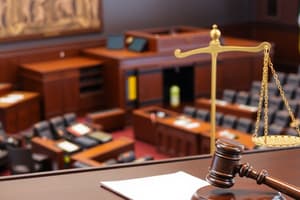Podcast
Questions and Answers
What is the primary aim of Parliamentary Law?
What is the primary aim of Parliamentary Law?
- To ensure that all discussions are formal and lengthy
- To limit the rights of members during assemblies
- To simplify and systematize the conduct of meetings (correct)
- To create a rigid set of rules for decision making
Which principle of Parliamentary Procedure ensures that the opinions of the minority are considered?
Which principle of Parliamentary Procedure ensures that the opinions of the minority are considered?
- Equality of Rights
- Minority Protection (correct)
- Majority Rule
- Full and Free Debate
Which of the following jargons refers to the presiding officer?
Which of the following jargons refers to the presiding officer?
- Motion
- Member
- Chair (correct)
- Floor
What does the term 'motion' refer to in a meeting?
What does the term 'motion' refer to in a meeting?
Which of these is NOT a fundamental principle of Parliamentary Procedure?
Which of these is NOT a fundamental principle of Parliamentary Procedure?
How is precedence applied in parliamentary procedure?
How is precedence applied in parliamentary procedure?
What does the term 'floor' signify in parliamentary law?
What does the term 'floor' signify in parliamentary law?
What historical influence shaped the American system of Parliamentary Procedure?
What historical influence shaped the American system of Parliamentary Procedure?
What is the purpose of allowing full and free debate in Parliamentary Procedure?
What is the purpose of allowing full and free debate in Parliamentary Procedure?
Which characteristic distinguishes Parliamentary Procedures from purely legislative processes?
Which characteristic distinguishes Parliamentary Procedures from purely legislative processes?
Flashcards are hidden until you start studying
Study Notes
Brief History
- Parliamentary Law regulates proceedings of assemblies through established rules and practices known as parliamentary procedure.
- Originated in England during the reign of King Edward VI from 1547-1553, notably within the English Parliament.
- The English Common Law influenced the legal systems of American colonies, ultimately evolving into a distinct American Parliamentary procedure.
- The Philippines adopted its parliamentary procedures from the American system, in part through Jefferson’s Manual.
- Common Parliamentary Procedures are designed to address the needs of various deliberative bodies, exemplified by Robert’s Rules of Order.
Fundamental Principles (Parliamentary Procedure)
- All members possess equal rights and responsibilities within the assembly.
- Decisions made by the majority are binding, reinforcing the principle of majority rule.
- Protection of minority opinions is essential, ensuring their voices are heard.
- Motions should focus on a singular subject to maintain clarity and order.
- Full and open debate is required, allowing diverse viewpoints to be expressed.
- Every motion presented must undergo a voting process for legitimacy.
- The collective interest of the group takes precedence over individual opinions.
- The presiding officer is required to remain neutral and impartial during proceedings.
Nature and Importance
- Designed to be inclusive, Parliamentary Law seeks to streamline conduct in meetings, facilitating efficient decision-making.
- The system emphasizes legal validity in the decisions made by the assembly, focusing on practicality rather than rituals.
Jargons & Terms
- Chair: Refers to the presiding officer or the position of leadership during meetings.
- Floor: Represents the space for all members other than the presiding officer, or their right to address the assembly.
- Meeting: An official gathering aimed at conducting business, characterized by continuous attendance without extended interruptions.
- Member: An individual entitled to full participation, including voting rights.
- Motion: A formal suggestion made by a member for the assembly to take specific action.
- Precedence: Denotes the priority or rank assigned to different motions.
- Question: A term synonymously used for motion, often employed informally to initiate a vote on a proposal.
Studying That Suits You
Use AI to generate personalized quizzes and flashcards to suit your learning preferences.



